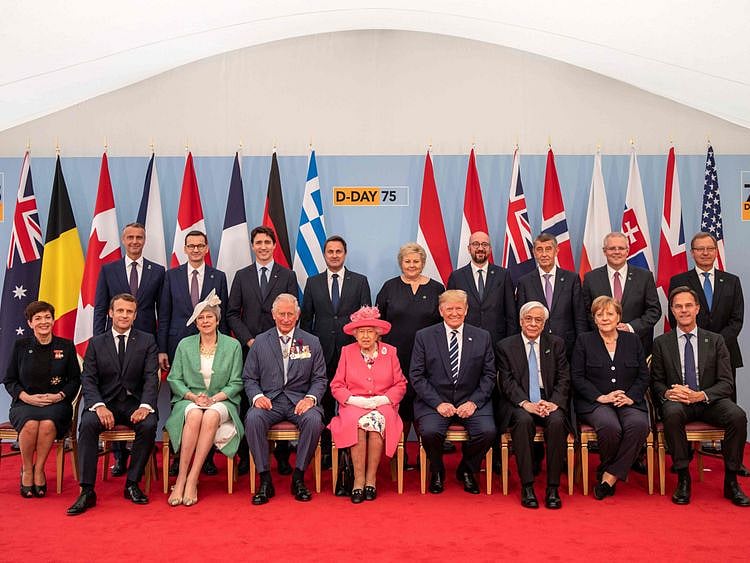Why Europe and US cannot be set apart
D-Day anniversary a timely reminder about the importance of close ties between allies

There are a great many remarkable aspects to the D-Day landings that commenced 75 years ago, and the crucial role they played in the liberation of Europe and — ultimately — the defeat of Nazi Germany.
First and foremost is the courage of those who contributed to the success of the largest amphibious-led invasion the world has ever seen.
Then there is the sheer scale of the logistical challenge Operation Overlord involved. Not only did the Allies seek to disembark a force in excess of 150,000 men on the shores of northern France. They also had to conceal their intentions from a vigilant enemy, and then, once the initial landings had succeeded, ensure that they had the right equipment and sufficient supplies in place to sustain the campaign. The inevitable question the success of the D-Day landings raises is: Could they happen again? Certainly, in an age when the minutest human activity is monitored by satellites and communication devices, it is difficult to envisage how commanders could conceal a 150,000-strong invasion force, together with a 7,000-strong armada of landing craft and warships, as the Allied commanders succeeded in doing in the late spring of 1944.
Then there are the great military thinkers, like Field Marshal Lord Bramall, who contend that, given the remarkable advances that have been made in military technology since 1945, it is inconceivable that the world could ever again survive the experience of total war.
The field marshal knows of what he speaks. Having taken part in the D-Day landings as a 20-year-old platoon commander, he was involved in the bitter fighting that ultimately led to Germany’s defeat, winning the Military Cross in the process. Then he found himself stationed in Japan in the aftermath of the atomic bombings of Hiroshima and Nagasaki.
Thus, as one of the few people still alive who has witnessed first-hand the terrible destruction wrought by modern warfare, Lord Bramall is firmly of the view that such wars will never be fought again. As he told me in a recent interview: “Having experienced total war myself, I came to the conclusion that this type of war could not be fought again.”
It is certainly true that, so far as today’s military thinkers are concerned, working out how to embrace new technologies such as cyber into their fighting capabilities is deemed to be just as important to winning future conflicts as being able to land a brigade of marines on foreign shores.
But apart from the debate about the relevance of large-scale military operations like D-Day to modern war-fighting, the other D-Day lesson that resonates today is the importance of maintaining close and effective relations between allies.
The ability of Allied commanders, as well as their political masters, to set aside their — at times — profound personal and policy differences in the build-up to D-Day and work together in pursuit of a common goal was central to the successful outcome of the war effort.
And politicians on both sides of the Atlantic divide should consider whether, faced with a existential threat on the scale of Nazi Germany, they could muster a similar level of cooperation to survive.
I say this not because a few followers of Jeremy Corbyn voiced their opposition to US President Donald Trump’s state visit in Trafalgar Square. The more important indicator of the enduring strength of US-UK relations, after all, was reflected in the genuinely warm sentiments expressed by both the Queen and Trump at the state banquet at Buckingham Palace.
Of greater concern is the growing rift between the United States and the Europeans in terms of their global outlook.
The most obvious dispute concerns defence spending, where the administration of United States President Donald Trump has just signed off a massive increase in the Pentagon’s budget, taking it to a thumping $750 billion (Dh2.75 trillion) or around 4 per cent of gross domestic product.
By contrast, most European members of Nato are struggling to meet the basic requirement of 2 per cent, leaving US officials to question why, with some justification, if Europeans will not pay for their own defence, American taxpayers should do so on their behalf.
Then there are contentious issues such as Iran, Huawei and climate change, where the Europeans seem to delight in adopting a contrary position to the US.
Of course free, democratic European nations are perfectly entitled to have their own opinions. But if they do so at Washington’s expense, the next time trouble comes knocking, they should not count on the US to help them out.
Con Coughlin is a noted political columnist who specialises in the Middle East.
Sign up for the Daily Briefing
Get the latest news and updates straight to your inbox
Network Links
GN StoreDownload our app
© Al Nisr Publishing LLC 2026. All rights reserved.